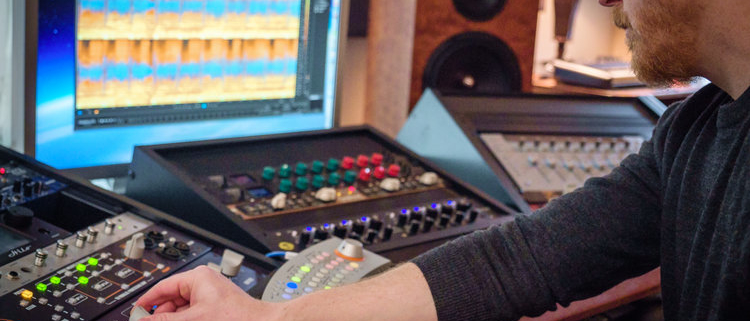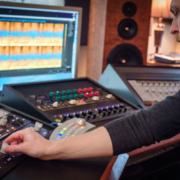Five Reasons Your Music Needs Professional Mastering
1) You’re too close to the project to be objective.
You’ve spent at least dozens and possibly hundreds of hours working on your recordings. You may have spent a solid week on the hook of just one song. You are confident that you know every note, quirk, and imperfection of your mixes inside and out – and that’s the problem.
Your audience probably isn’t going to care about the little waver in the tenor part in measure 42 of your lead-off track. They’re not going to care that the filter you used on the Rhodes organ has a Q setting that’s a “little too round”. They won’t necessarily care that the cymbals are hard-panned L-R, instead of 75-75. What your listeners will care about is whether or not your music moves them, even if they don’t know why.
After pouring your heart and soul into the project, it’s common for an artist or producer to develop “tunnel vision” and to have a difficult time seeing the forest for the sonic “trees”. You might obsess over something that most audiences won’t even hear, while missing something that others will pick up on during their initial listen-through. Further, if you’ve been working hard on your mixes for days, weeks, or months, you may well have hit a wall; your mixes sound very good, but you can’t make them sound any “better”. You’re not even sure if you need to keep trying.
Every listener has the potential to be affected by a different part of a mix, but often there are certain aspects of a recording that have the potential to be more impactful or distracting than others. A professional mastering engineer has the ability to assess which elements of a recording should be highlighted or augmented (e.g. the vocal/solo, bass, drums, or depth/width) and which should be “fixed” or have less focus (e.g. sibilance, undefined low end, low energy, or “oomph”), and has both the tools and the ability to skillfully and musically make these adjustments.
Perhaps most importantly, a professional, independent mastering engineer brings an objective, highly trained, experienced ear to the project, and won’t be influenced by largely non-musical factors such as egos or decisions made during the mixing process which become so ingrained in an artist or mixer that they can lead to sonic “blind spots”.
2) You can’t hear everything that is happening in your mixes.
This doesn’t mean that you have a hearing problem, or that your ear isn’t “good”. More and more frequently, mixers are creating their music outside of the traditional recording studio. “Bedroom” studios are exploding in popularity as technology becomes more accessible and affordable, even while budgets continue to shrink. This allows for a great deal of creativity – especially when a mixer doesn’t have to worry about being “on the clock” and can experiment to their heart’s content – and often yields some terrific results.
However, unless you’ve designed your home studio from the ground up with an ear towards negating nodes, early reflections, standing waves, and other sonic anomalies, it’s unlikely that you’ll be able to accurately hear everything that is happening in your room – and and in your mixes. This is especially true in the lower frequencies, which are extremely powerful and almost impossible to control with the usual acoustic treatments (foam, blankets, fiberglass, diffusors). As a result, at a minimum your mixes may have more or less low-frequency content than you think they do, and this can cause a number of issues both sonic (such as a “boomy” or “muddy” sound) and musical (fundamentals not ideally balanced).
Professional mastering rooms can accurately reproduce frequencies from ~20Hz to 20kHz, and are equipped with specialized and ultra-precise monitoring systems that will accurately play back these frequencies. In these environments a mastering engineer can quickly and reliably make decisions about a mix, knowing exactly how the music will sound in the “real world”.
3) You don’t know how your music will translate on other speakers.
Recording studios typically have monitoring systems which are designed for recording and mixing playback, not for mastering. These systems may make the music sound great (which is not necessarily a good thing), or not so great (which could be a good thing), but they represent just one sonic “picture” of what a mix sounds like. Even when a recording studio has multiple monitoring systems (always a good thing), it’s impossible for a mixer to know how the final mix will sound on every system.
Professional mastering studios typically have multiple monitoring systems built from the ground up using high-quality cabling, powerful and transparent amplifiers, clean and consistent power, precision-built converters and routing matrices, and mastering-specific monitors and subwoofers. This configuration allows the mastering engineer to both know precisely what they are hearing and to first “do no harm” to the audio. Ideally, all music being sent for mass distribution should first pass through one of these systems.
Perhaps equally important is the referencing of mixes on “lo-fi” or “limited-fi” playback systems which more closely represent what most listeners will be using to play music in the wild. These systems can include actual worn out, halfway functional speakers, speakers which model a typical car stereo setup, a home theater setup, laptop speakers or other small speakers which physically cannot produce frequencies <100Hz, hyped headphones which impart a “smiley” (higher bass and treble) EQ curve onto the music, or the ubiquitous iPod earbuds.
If you plan to distribute your music digitally or on the radio, your mixes will be usually stripped of certain frequency content (after they have left your hands) during the compression process required to make your files small enough to be quickly downloaded. This is literally a “lossy” process, and it’s imperative that you know what your files will sound like post-compression. Using tools designed to emulate this process, a mastering engineer can ensure that what is “lost” is as audibly minimal as possible, and that your mixes hold up well to the necessary compression and do not end up distorted, tinny, or “small”, and that they stand up well to other music in the marketplace.
Your music has to sound as good as it possibly can on ALL systems and in ALL formats, and a professional mastering engineer working in a properly equipped, dedicated mastering facility can help make sure that it does.
4) You haven’t listened to thousands of other similar mixes in the same environment.
Like many things, creating great recordings is a process that is improved with repetition. As a mixer, your hundredth mix is typically going to sound better than your first mix. And after you’ve mixed a thousand songs, you’re likely to look back at that hundredth mix and wonder “What was I thinking? Couldn’t I hear all the things “wrong” with this “better” mix?”.
If you’ve mixed a few thousand songs of a similar style, or even just sat and listened to a few thousand similar mixes in the same room using the same monitoring setup, the chances are good that you know exactly what a mix of that style “should” sound like in that environment. But what if you haven’t had the time or opportunity to do this?
A professional mastering engineer hears many mixes of all styles, and has often listened to more mixes – by more mixers – than the average listener will in a lifetime. Some mastering engineers specialize in a certain style of music, others work on a more varied mix. Regardless of the style of music, many of the “hits” that the average listener enjoys have likely come across the desk of a professional mastering engineer.
If there’s a question about how a track of a certain musical style “should” sound, a mastering engineer with a great deal of experience with that style of music likely has a hyper-focused and reliable first-hand reference to compare against. In combination with their ears, equipment, monitoring environment, and objectivity, this perspective is a singularly powerful tool – one you want in your project’s toolbox.
5) Professional mastering can make good mixes great.
All of the technical and logistical reasons aside, the ability of a professional mastering engineer to simply make music sound better is perhaps the most important reason to invest in their services.
The most successful music is always sent to a professional mastering facility – for the gear, the room, the ears, the experience, and the perspective found there. The best mixers in the world – the guys and gals whose work you hear on the radio, TV, and in your iPods – demand that their mixes are passed by a professional mastering engineer before being released. They know that if they’ve made a good mix that could be just a bit better, that mastering engineer will be able hear it and will be singularly equipped to carefully make the adjustments that take the mix from good to great.
And who doesn’t want to be great?
———————————–
— Dave Sperandio is the owner of Vocal Mastering, based in Durham, NC.





Leave a Reply
Want to join the discussion?Feel free to contribute!